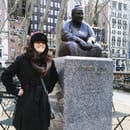[Image description: The header image is a black icon of a person in wheelchair superimposed over a rainbow LGBTQ flag]
Tameeka L. Hunter, an intersectional social justice scholar and lecturer at Georgia State University, visited Agnes Scott College on Tuesday, October 31st to present her research and personal story in a presentation entitled “Exploring the Resilience of LGBTQ Individuals with Chronic Illness and Disability.”
Hunter began the presentation by sharing her own disability story. Hunter has cerebral palsy, a congenital disorder that affects movement, muscles, and posture, and she uses a motorized wheelchair. “I don’t use the term birth defect because I don’t consider any part of myself defective,” she said.
Photo used with permission of Tameeka Hunter.
As a young woman, Tameeka Hunter explained that though she was academically gifted, she often felt she didn’t fit in socially with “regular ed” students because she used mobility aids such as crutches and braces. However, when she met other students with physical disabilities, she didn’t quite feel comfortable around them either as she took all regular ed courses. She described the emotional pain she experienced after her initial excitement to find other African-American, physically disabled women in her community — only to have them laugh at her and belittle her goals.
Ultimately, their discouraging words didn’t affect her determination. “They may not think they can do this, but they’re not me,” she said.
Tameeka Hunter is also part of the LGBTQ community and identifies as pansexual. She describes her journey of discovering her sexuality as an experience of mixed emotions. “When I was dating, I started to realize that gender didn’t make a difference to me.” Hunter candidly describes initially being upset that another marginalized identity was now part of her life: being disabled, being a woman, being African-American, and not being straight seemed too much to bear. The experience has a happy outcome, however. “I ended up falling in love and marrying a woman,” Hunter says, smiling.
Hunter began her research on the intersections between the chronically ill/disability community and the LGBTQ community when she noticed a gap in the literature and the scarcity of research related to resilience and coping. Her research documents the struggles of LGBTQ people with disabilities through an empirical phenomenological study that includes participant quotes and anecdotes. Many of the study participants describe being told they must focus only on one part of their identities, their LGBTQ or disability identity, not both. Some individuals mentioned having been told that “[That community] has their own event,” or “you have to pick what’s more important to you.” Hunter’s presentation and research highlight the importance of recognizing that people’s identities exist intersectionally — that one can be disabled and gay and a woman, and that those identities interact with each other in different situations. Hunter also noted the importance of recognizing and advocating for physical disabilities that aren’t immediately visible, which are sometimes called “invisible disabilities/chronic health conditions.”
Are you wondering how you can advocate for disabled people in your daily life? One thing you can do immediately is cut the use of ableist language like “lame” and “handicapped” from your vocabulary and challenge those around you to do the same. People who use ableist language in daily conversation may be hurting those around them and not even be aware of it.
Photo by Matt Artz on Unsplash.
Additionally, Hunter recommends that if you’re planning an event, or even just inviting people to an event, “share in the labor of seeing if events are accessible — don’t rely on the disabled person to do this.” She also notes that this should be a common occurrence: “Don’t just do it when you know someone is coming with a mobility impairment. Make it a usual part of your planning.” So the next time you’re making a Facebook event for a birthday party, student organization outing, or something similar, include information like whether the venue is wheelchair accessible, whether strobe lights are used, and whether scented products are used. This kind of compassion is a simple way to make everyone feel included. As Tameeka Hunter puts it, “Accessibility is reinforcement that you’re part of a community.”

